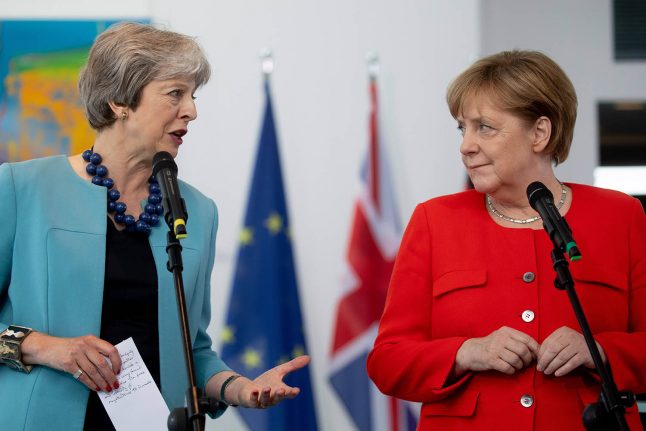The pound plunged on currency markets as European Union leaders and British parliamentarians responded with scepticism to her request, made ahead of a Brussels leaders' summit on Thursday.
Exactly 1,000 days on from Britain's seismic 2016 referendum vote to leave the EU, a divorce deal negotiated by May has been blocked in parliament and uncertainty continues to grip the country.
SEE ALSO: No-deal Brexit: UK vows to cover health costs of retired Britons for one year
She is seeking to put back the March 29 exit date to try one more time to get her agreement passed, but said any further postponement would undermine voters' trust.
However, the European Commission advised EU leaders that a shorter delay to May 23 or a much longer one until at least the end of 2019 would be preferable.
The other 27 EU leaders must unanimously agree any delay, but Commission President Jean-Claude Juncker said it was unlikely they would take a decision this week unless London set out a clear plan, suggesting another meeting might be needed next week.
Germany welcomes 'clear request' for delay
A spokesman for German Chancellor Angela Merkel welcomed London's “clear request”, and said she would “make every effort” to bring about an agreement at the Brussels summit.
But her foreign minister Heiko Maas of the junior coalition partner Social Democrats was less conciliatory, saying May's letter “only pushes the solution further down the road”.
In Paris, French Foreign Minister Jean-Yves Le Drian also had a tough message.
“A situation in which Mrs May is unable to deliver sufficient guarantees on the credibility of her strategy at the European Council meeting would lead to the request being refused and a preference for a no deal,” he told parliament.
'Crisis, chaos and division'
The British Parliament has been deadlocked for months over Brexit, with MPs unable to decide how to implement the referendum result, and voters themselves are also sharply divided.
But Britain is now in crisis, facing the potentially catastrophic prospect of leaving its biggest trading partner after 46 years next week with no arrangements in place.
May reluctantly accepted this week that a delay to Brexit is now needed, and told MPs Wednesday that she had written to EU President Donald Tusk “informing him that the UK seeks an extension… to June 30”.
But she was confronted with a barrage of criticism from Brexit hardliners who want to leave on March 29 regardless, as well as pro-EU lawmakers who want a longer delay to seek a new strategy.
May faced shouts of “resign”, while opposition Labour leader Jeremy Corbyn accused her of leading Britain into “crisis, chaos and division”.
Speaker of parliament John Bercow later granted Labour's request for an emergency debate on the delay.
'Resignation threat?
In her letter to Tusk — addressed as “Dear Donald” — May said she intended to bring her deal back to the Commons “as soon as possible”, arguing that if it passed, she would need the delay until June 30 to implement the treaty.
If the text is rejected a third time, May said MPs would have to decide what happened next.

British Prime Minister Theresa May. Image: DPA
“As prime minister, I am not prepared to delay Brexit any further than June 30,” she said, in comments interpreted as a hint about her own future.
She said delaying any longer would require Britain to hold elections for the European Parliament, which would be “unacceptable”.
However, the European Commission, the EU's executive arm, said the June 30 date carried “serious legal and political risks”.
In a phone call with May on Wednesday, Juncker urged her not to set a date that was beyond the European Parliament elections, due to be held between May 23 and May 26.
'End of the road'
After almost two years of talks, May and the EU struck a divorce agreement late last year, but MPs have overwhelmingly rejected it twice.
Her plan to hold a third vote this week was dramatically blocked by Bercow, who said May could not keep bringing the deal back to MPs without substantive changes. European leaders shared the frustration in London.
Juncker told German broadcaster Deutschlandfunk the deal agreed was the final offer, warning: “Nothing more can be done, we've reached the end of the road.



 Please whitelist us to continue reading.
Please whitelist us to continue reading.
Member comments